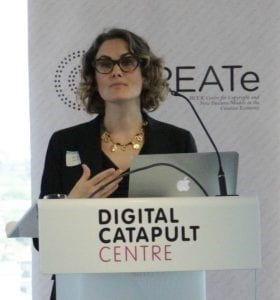Blog post by Dr. Nicola Searle
In the age of digital, the creative industries have been transformed as new technologies, formats and platforms introduce a dizzying array of possibilities. One of these possibilities is the concept of new business models – that is, new ways of structuring businesses in the creative industries to take advantage of the new opportunities. However, business models in the creative industries have been remarkably stable.
As part of a research project funded by CREATe at the University of Glasgow, Dr. Nicola Searle (Goldsmiths) developed a meta-analysis of business models in the creative industries based on five years of research by the centre. Her findings are surprising – business models have largely not changed as a result of the digital era. Instead, firms in the creative industries have largely stuck to what they have always done – selling products and services to their clients.
A business model, “describes the rationale of how an organization creates, delivers, and captures value.” (Osterwalder & Pigneur, 2010) 1 A well-designed business model should help a business take advantage of their existing assets, and develop strategies for long-term survival. Business model innovation, the process by which new business models are developed, is something we would expect to see in the changing landscape in the creative industries. However, Dr. Searle’s research suggests that is not the case as the core value capture – selling goods and services – is stable. While some of the bigger players in the creative industries, like platforms such as Spotify, are introducing new business models, the typical firm in the creative industry has not changed its core proposition.
You can read more about Dr. Searle’s findings in her CREATe working paper here. The report also includes a policy analysis, detailing the interaction between business models, Intellectual Property (IP) and UK government policy. This work is part of Dr. Searle’s on-going research and is currently being expanded to capture a wider sample size for the meta-analysis.
1 Osterwalder, Alexander and Yves Pigneur (2010) Business model generation: a handbook for visionaries, game changers, and challengers

Photo caption: Dr. Searle launching the report, “Business Models, Intellectual Property and the Creative Industries: A Meta-analysis” at the Digital Catapult Centre earlier this year.